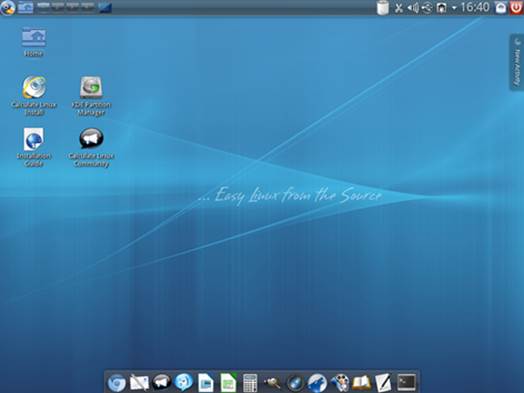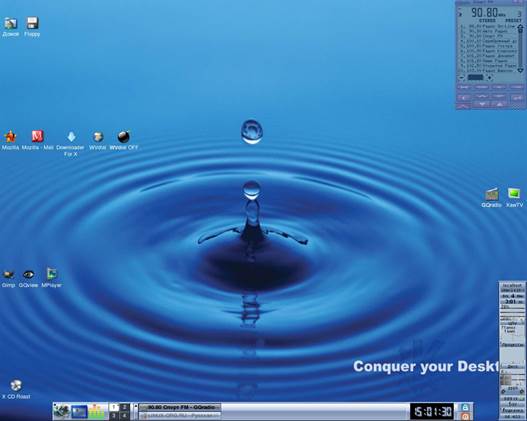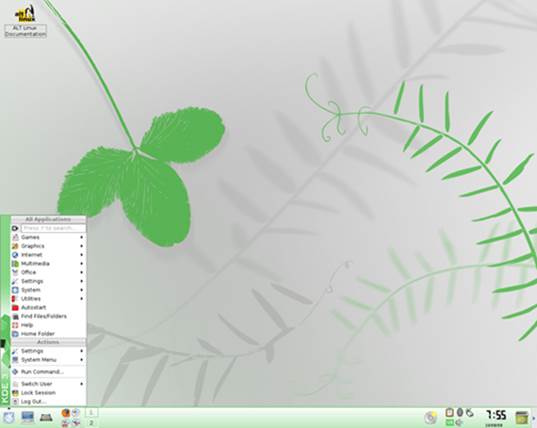When we start to discuss corporate Linux
versions, both IT integrator companies and government agencies tend to use
original and unmodified distributions such as RHEL, SLES, CentOS, Debian and
AltLinux Server. It should also be noted that the Ministry of Defence has its
own versions of Linux called MCBC – a Mobile System for the Armed Forces. The
government research institute created it early in 2003 on a Red Hat Linux base,
with broad consultancy support from one of Russia’s Red Hat partners.
Fundamentally, there’s nothing special about MCBC though – a simplified UI
interface a la Windows95 and certified internal components to monitor access to
the system. What could be particularly interesting is the fact that MCBC has
been ported to MIPS, x86 and SPARC platforms. The system is distributed among
large government customers on a paid basis and isn’t available in the public
domain.

CalculateLinux
is based on Gentoo Linux
Another Russian company that creates
exciting business solutions is Etersoft. It sells its boxed solutions built
upon a heavily redefined WINE package. Thus, one of the most promising products
is SELTA@Etersoft - a universal SQLqueries translator from T-SQL into pgSQL.
Such transformation allows the use of the PostgreSQL server for a number of
applications designed purely to work with Microsoft SQL Server only. So how
does the translator work? It parses requests to MS SQL system tables, and
adapts them transparently to PostgreSQL notation. So you don’t need to
interfere either with the server or the client program.
Now let me describe the problems that occur
with GNU/Linux once it is deployed in real life by Russian companies. The main
problem is the quality and experience of the technical personnel, who’re
primary responsible for the transformation project – from Windows to Linux. The
vast majority have never faced any UNIX system before. Therefore, they have
great difficulty orienting themselves to the UNIX philosophy and they follow
one simple principle – dumb replacement of one Windows GUI with a
similar-looking GUI, but under the Linux logo. Naturally, the features that
make Linux a truly unique system aren’t reclaimed and aren’t used at all.
The second reason is a
difficult-to-eradicate myth about the importance of a nationwide distribution.
If there had been one created earlier, with Russian (Hindi, Brazilian, you name
it) localization and other bells and whistles, it would be distributed in a
blink of an eye. However, the long history of AltLinux shows another trend –
there could be, de-facto, an already existing national distribution. In our
case, AltLinux has no rudiments of the original MandrakeLinux because AltLinux
was completely redesigned 10 years ago. There already exists a great channel to
spread AltLinux both on CDs/DVDs, as well as multiple tutorials written by
AltLinux authors for teaching and learning purposes, and there’s great support
from the company. But there’s still Windows domination. Why? On the one hand,
there is strong pressure from both the Microsoft side and from the financial
department of any enterprise that decides to purchase Win32/ Win64 products
only. This can be explained only by this fact – real ignorance of whatever
systems exist outside the Microsoft world. However, even when decision makers
are aware of Linux/UNIX, their reason is usually this one: “We have specialists
familiar with Microsoft, but we haven’t any Linux specialists. Therefore, we
take Microsoft.” Strange, isn’t it? Sadly, the truth is that sometimes,
companies do not even have an IT department with sufficient Microsoft
experience.
Another big problem is a strong existence
of other myths (this is particularly evident with MCBC Linux): “There exists a
purely native (Russian/Indian/German) Linux innovation and only selected
specialists are keen to understand it”. This problem is really a huge one,
because when some kind of problem arises, there’s usually a solution outside of
this closed world. For example, you should try to find fixes for Ubuntu
packages not within the Ubuntu world only, but among Debian users too!
The third big problem is that engineering
and IT personnel training is done with Microsoft products. This situation is
rather typical for middle schools, as well as for higher education
institutions. The courses devoted to UNIX topics are organized and created
mostly by enthusiasts or organized by big vendors – so such training can be
considered as supplementary to the selling channel of Linux software and
middleware. The education policy in this aspect is still driven by the
country’s educational agency.

Linux
For You _ ALT Linux: Master 2.2
But the real surprise comes from a place no
one expected before. First, Russia has a national search giant – Yandex. It
uses Linux for its own purposes – server infrastructure. So it’s allocated its
resources to maintain the huge repository of core Linux distributions:
AltLinux, ArchLinux, ASPLinux, CentOS, Debian, Ubuntu, Slackware, Mandriva, and
others. It has also provided space for such office suites as OpenOffice,
LibreOffice and Mozilla. They mirror kernel.org, VLC, MySQL, KDE, GNOME and
some others. From this perspective, the national software repository is already
here. Moreover, the agreements on free peering are achieved with a number of
local ISPs throughout the whole country. This fact alone creates an ideal
opportunity for sharing any distro. In addition to free access to the Yandex
repository, it also provides free hosting facilities to video, pictures, Web
hosting, etc. So there’s no problem in distributing any books, presentations or
videos on Linux.
SMB-sized companies that have
Linux-familiar IT staff silently migrate their network infrastructure onto
Linux/FreeBSD/OpenSolaris, because its mission-critical nature allows firms to
have 24x7 business. Occasionally, the government sector behaves similarly,
unless there’s particular Win32 software imposed from the federal government
level. Having IT infrastructure based on Debian, Ubuntu or CentOS allows a
government institution to save money, and instead of spending on Microsoft
products, it can purchase more hardware or order custom software. The bigger
advantages are from professionals that come to the government sector from
commercial companies. They bring experience and knowledge with them and that is
most important – the desire to change the infrastructure to be the one ‘right’
standard. Unfortunately, this is a temporary scenario, due to the financial
crisis and other local factors. Once the business situation improves, such
personnel return to the private sector where wages are usually higher.
In Russia, there exists an analogy to
the Linux
Foundation, known as the Russian
Association for Free Software (RASPO). The idea behind it is rather strong, but
unfortunately this committee tends to operate like a software ‘club’ –
promoting the business ideas of its members and not general Linux principles,
as it should. Having been created in 2009, nobody can see it in a big, serious
project, though.
The same group has a newly born ‘National Software
Platform’ initiative, which was formed last summer. The objectives of this
initiative were declared to be too broad – ranging from the creation of a
national Linux distribution (another one, in addition to existing MCBC and
AltLinux?) to setting up the policy on how to use (F) OSS within the government
sector. It’s hard to believe this national platform will be effective, because
the participants are the same RASPO mentioned earlier, plus a number of
non-profit enterprises and several government research institutions. Will it be
able to make another corporate Russian distribution? Probably, it will. But
what about a stable and strong community? This question still remains open. At
the moment, higher efficiency is shown by the middle-size private companies,
which can create the finest products compared to those from state-owned
enterprises. Miracle? Yes, it’s true. Russia ignites technologies and
specialists born to be professionals in Linux, but is unable to create one
unified atmosphere for greater Linux government adoption – in schools,
universities and within the government itself.

AltLinux
In September, the AltLinux Company
announced its withdrawal from the RASPO board. Either this decision was
connected to fundamental differences between RASPO members, or the company
decided to focus on Linux and not to disperse its efforts onto different
initiatives - this is still unclear. Anyway, time will show who was right. And
in August 2011, Red Hat opened its Moscow office. Although it doesn’t yet plan
to bring in development resources, no one can predict exactly how this will
affect the corporate Linux sector in Russia. In general, we note just one
thing: the current state of Linux in the local market reminds us of chaos.
Amazingly, there’s always something new that’s born out of such chaos!